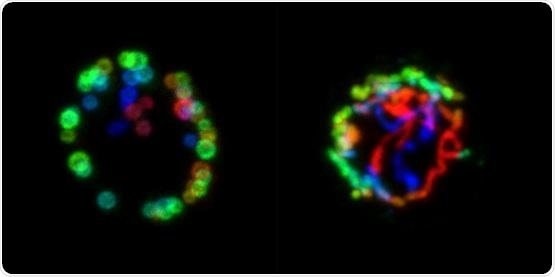A research conducted by Biomedicine Discovery Institute (BDI) of Monash University extends one’s interpretation of the molecular pathways that regulate the function and survival of T cells and how it is associated with the declining immunity of T cells in the elderly.

Young versus an old T cell, showing how the mitochondria become more networked (indicative of increased metabolic state) with age. Image Credit: (C) Felix Kraus - Monash BDI.
Published in the Nature Communication journal, the findings demonstrate that the increased metabolism of T cells noticed in advanced age indicates that they were functioning harder only to survive.
The study was headed by Nicole La Gruta, a Professor of BDI at Monash University and Dr Kylie Quinn (formerly of Monash University BDI and presently Vice-Chancellor’s Research Fellow at Royal Melbourne Institute of Technology (RMIT) University).
These findings contradict prior understanding, which had proposed that an increased metabolism indicates the function of T cells, and will hold implications for developing targeted interventions, like immunotherapies or vaccines, to treat immune dysfunction related to age.
T cells are known to play a significant role in the body’s immune reaction to tumors and viral infections; however, the immunity of T cells fades as people age, thereby increasing their sensitivity to these diseases.
We’ve shown that an amped-up metabolism, rather than arming cells to fight pathogens better, is associated with T cell survival over a lifespan. The cells need to substantially increase their metabolism just to survive in the relatively hostile environment of the elderly.”
Nicole La Gruta, Professor, Biomedicine Discovery Institute, Monash University
“This work is important because one of the hallmarks of immune aging is the loss of T cells. So it provides clues on how we might promote T cell survival in the elderly, and so boost T cell immunity,” added Professor La Gruta.
According to Dr Quinn, the findings supported additional studies to devise treatments and interventions that aid metabolism during aging to support the human T cells to both survive and thrive.
Ultimately we want to support healthy ageing by designing ways to improve T cell metabolism during cell-based immunotherapies such as CAR T cell therapy, and boosting T cell activation in new vaccines.”
Dr Kylie Quinn, Vice-Chancellor’s Research Fellow, Royal Melbourne Institute of Technology
Source:
Journal reference:
Quinn, K. M., et al. (2020) Metabolic characteristics of CD8+ T cell subsets in young and aged individuals are not predictive of functionality. Nature Communications. doi.org/10.1038/s41467-020-16633-7.